How Goal Setting Enhances Student Motivation and Achievement
Blaine Taylor
Abstract
This literature review explores the role of goal setting in enhancing student motivation and achievement, with a focus on its connections to self-regulation, feedback, and instructional practice. Drawing on both theoretical foundations and empirical studies, the review emphasizes that specific, challenging goals—supported by progress monitoring and constructive feedback—promote persistence, self-efficacy, and adaptive strategy use. Classroom context and student differences are shown to influence outcomes, with mastery-oriented climates and differentiated supports fostering stronger engagement and resilience.
At the same time, the review identifies limitations in the existing research, including short-term study designs, inconsistent definitions of interventions, and a lack of diverse participant populations. Future directions highlight the importance of longitudinal approaches, culturally inclusive research, and the integration of digital tools to strengthen applicability in modern classrooms. Taken together, the evidence indicates that thoughtfully implemented goal-setting practices not only improve academic performance but also build transferable skills of confidence, adaptability, and persistence that extend beyond school.
Paper:
pdf
DOI:
https://doi.org/10.71002/iecs.v5n4p18
 This work is licensed under a
Creative Commons Attribution 4.0 License.
This work is licensed under a
Creative Commons Attribution 4.0 License.
Contact us
- Jerry Lee
- iecs@stslpress.org
